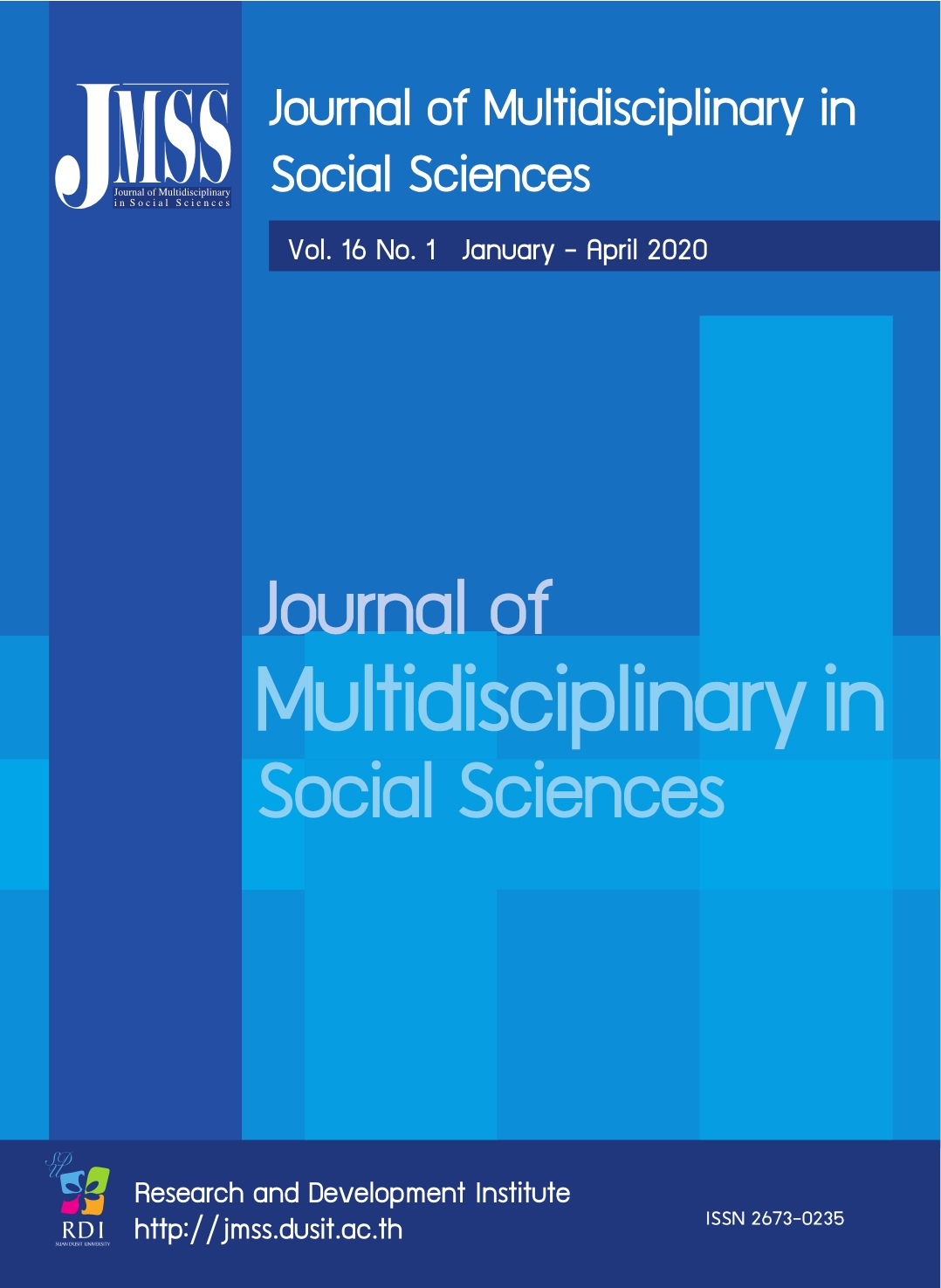Impacts of Logistics and Supply Chain Policy on Farmers’ Well-Being
Keywords:
Logistics, Supply chain, Farmers, Rice, Well-being, Public policyAbstract
Thailand's master plan for logistics and supply chain development for agriculture (2017-2021), initiated by the Ministry of Agriculture and Cooperatives, focuses on logistics and supply chain of agricultural sector including fruit and vegetable, rice, sugarcane, oil palm, and cassava. Suphanburi is well-known as an important farmland for rice production. Hence, this study examines the impacts of logistics and supply chain policy on the farmers’ well-being in this area. The samples of this study were 250 farmers in Suphanburi, Thailand. The data was collected using questionnaire as a research tool. This study employed multiple regression analysis (MRA) for hypothesis testing. The results indicated that strengthening the capacity of farmers’ institutions (SCFI), and improving logistics infrastructure (ILI) has positive impacts on farmers’ well-being (FWB). However, using technology and innovation (UTI), and creating value of supply chains for farmers (CVSC) had no impact on the FWB. Discussion and recommendation are discussed in this paper.
References
Breslow, L. (1972). A quantitative approach to the World Health Organization definition of health: Physical, mental and social well-being. International Journal of Epidemiology, 1(4), 347-355.
Charoonpipatkul, N. (2018). Exposing Thailand’s logistics system. Focused and quick, 134(August), 1-8.
Dixie, G., & Jayaraman, N. (2011). Strengthening agricultural marketing with ICT. Retrieved April 1, 2020, from http://ai3.itb.ac.id/~basuki/presentasi/ICT%20&%20Agri/Section%203/final_Module9_Assessing%20Market%20and%20Value%20Chains_Strengthening%20Agricultural%20Marketing%20With%20ICT.pdf
FAO (2014). Developing sustainable food value chains: Guiding principles. Retrieved May 8, 2019, from https://www.fao.org/3/a-i3953e.pdf
Gasper, D. (2004). Subjective and objective wellbeing in relation to economic inputs: Puzzles and responses. WeD Working Paper 09. Bath, UK: Wellbeing in Developing Countries ESRC Research Group (WeD).
George, D., & Mallery, P. (2003). SPSS for Windows step by step: A simple guide and reference. 11.0 update (4th ed.). Boston: Allyn & Bacon.
Grossman, J., & Tarazi, M. (2014). Serving smallholder farmers: Recent developments in digital finance. Washington, DC: CGAP (Consultative Group to Assist the Poorest).
Hair, J.F., Black, W.C., Babin, B.J., & Anderson, R.E. (2014). Multivariate data analysis (7th ed.). Essex, UK: Pearson Education Limited.
Helliwell, J. F., & Putnam, R. D. (2004). The social context of well-being. Philosophical Transactions of the Royal Society B: Biological Sciences, 359(1449), 1435-1446.
Jack W, & Suri T. (2014). Risk sharing and transaction costs: Evidence from Kenya's mobile money revolution. American Economic Review, 104(1), 183-223.
Kaplinsky, R., & M. Morris. (2001). A Handbook for value chain research. Prepared for the International Development Research Centre, Ottawa.
Karippacheril, T.G., Rios, L.D., & Srivastava, L. (2011). Global markets, global challenges: Improving food safety and traceability while empowering smallholders through ICT. Retrieved April 1, 2020, from https://elibrary.worldbank.org/doi/10.1596/978-1-4648-1002-2_Module11
Kittisuksathit, S. (2017). HAPPINOMETER: Happiness self-measuring tool. Nakhon Pathom: Institute for Population and Social Research, Mahidol University. Inequality in rice farmers’ access to a government assistance program in rural Thailand.
Laiprakobsup, T. (2017). Inequality in rice farmers’ access to a government assistance program in rural Thailand. Asian Politics & Policy, 9(3), 442-461.
Ministry of Agriculture and Cooperatives. (2018). Thailand's master plan for logistics and supply chain development for agriculture (2017-2021). Bangkok: Ministry of Agriculture and Cooperatives.
Muneerat, P., & Chinokul, S. (2014). The development of English reading materials using inference strategies instruction to enhance English reading comprehension ability of upper secondary students: A case study of tenth grade students of Chonkanyanukoon School. An Online Journal of Education, 9(1), 521-533.
Msuta, P.B., & Urassa, J.K. (2015). The contribution of farmers’ organizations to smallholder farmers’ well-being: A case study of Kasulu district, Tanzania. African Journal of Agricultural Research, 10(23), 2343-2349.
Namkham, N., & Booncharoen, S. (2017). Supply chain management, Chao Phraya River Community Enterprise Group. Industrial Technology Lampang Rajabhat University Journal, 10(1), 40-49. OECD. (2010). Economic importance of agriculture for poverty reduction. Retrieved May 8, 2019, from https://www.oecd.org/brazil/44804637.pdf
OECD. (2011). How’s life? Measuring well-being. Retrieved May 7, 2019, from https://unstats.un.org/unsd/broaderprogress/pdf/How's%20life%20-%20Measuring%20well-being.pdf
Pedhazur, E. J., & Schmelkin, L. P. (1991). Measurement, design, and analysis: An integrated approach. Hillsdale, NJ: Lawrence Erlbaum Associates.
Peel, D., Berry, H.L., & Schirmer, J. (2016). Farm exit intention and wellbeing: A study of Australian farmers. Journal of Rural Studies, 47(2016), 41-51.
Pollard, E., & Lee, P. (2003). Child well-being: a systematic review of the literature. Social Indicators Research, 61(1), 9-78.
Promphakping, B. (2012). Well-being. Journal of Humanities and Social Science, 29(2), 23-50.
Raimbekov, Z., Syzdykbayeva, B., Baimbetova, A., & Rakhmetulina, Z. (2016). Evaluating the impact of logistics infrastructure on the functioning and development of regional economy. Retrieved May 8, 2019, from https://www.researchgate.net/publication/309093273_Evaluating_the_impact_of_logistics_infrastructure_on_the_functioning_and_development_of_regional_economy
Ryff, C. D. (1989). Happiness is everything, or is it? Journal of Personality and Social Psychology, 57(6), 1069-1081.
Schmider, E., Ziegler, M., Danay, E., Beyer, L., & Bühner, M. (2010). Is it really robust? Reinvestigating the robustness of ANOVA against violations of the normal distribution assumption. Methodology: European Journal of Research Methods for the Behavioral and Social Sciences, 6(4), 147-151.
World Bank. (2016). World development report 2016: Digital dividends. Washington, D.C.: World Bank.
World Bank. (2018). International LPI 2018. Retrieved May 6, 2019, from https://lpi. worldbank.org/international.
Downloads
Published
How to Cite
Issue
Section
License

This work is licensed under a Creative Commons Attribution-NonCommercial-NoDerivatives 4.0 International License.








